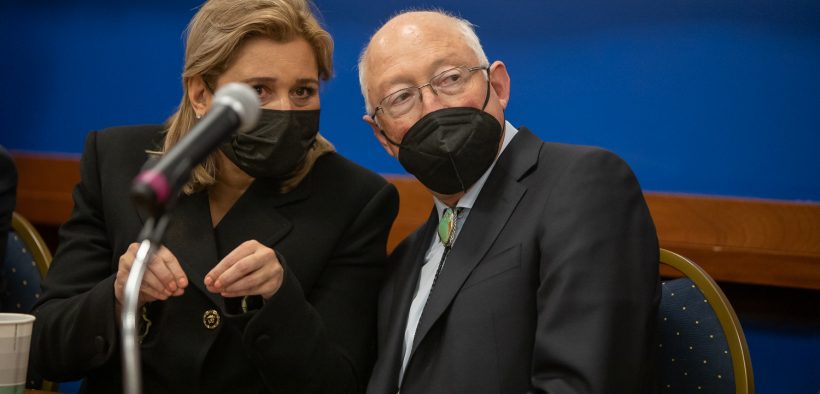CIUDAD JUÁREZ — U.S. Ambassador to Mexico Ken Salazar signed an agreement with mayors of six cities in Chihuahua, with the goal of preventing violent crime, building citizen trust in Mexican police forces and reducing corruption.
“This can be a historic moment because it can mark a new start in ensuring our people can live without fear,” Salazar said.
The U.S. Agency for International Development will fund the initiative as part of a four-year, $19.4 million Violence Prevention and Reduction Activity program across 32 cities in 10 states in Mexico. Details about how the funding will be used to help reduce violent crime were not discussed and Salazar did not hold a scheduled press conference because he had to catch a flight to Tijuana right after the signing ceremony.
Salazar and Chihuahua Gov. Maria Eugenia Campos Galvan led the signing ceremony Friday night at the U.S. Consulate in Ciudad Juárez.
“The time has come to think of the border region as a unique binational community,” Campos said. “It’s impossible now to see ourselves, as we have in the past, as a clash of countries or as a divided population. Now is the moment to move forward as one binational community.”
The state of Chihuahua is experiencing a renewed spike in violence, with Ciudad Juárez listed as second behind Tijuana in the number of murders tracked by the civic organization Causa en Común, using data gathered by Mexico’s federal government.
Juárez had about 1,000 murders between January and October of this year.

Mexican border states are also coping with human smuggling and thousands of migrants moving through on the way to the U.S. border. Many are stuck in cities like Ciudad Juárez under the Migrant Protection Protocols, or “Remain in Mexico” policy, awaiting a decision on their asylum claims in U.S. immigration court. Thousands more have been expelled to Mexico under the pandemic health rule known as Title 42.
The migrants often become prey to criminals in border cities and victims of kidnapping and extortion.
Campos said the United States and Mexico must confront the challenges that affect both sides of the border and tackle the root causes of migration.
“We must recognize in each migrant there’s a person, a person who left behind a home and family to look for better opportunities,” she said.
During the North American leaders meeting in Washington last month President Joe Biden, Mexican President Andrés Manuel López Obrador and Canadian Prime Minister Justin Trudeau discussed coordinating on migration, development and security issues.
Salazar said along with federal governments, the Biden administration is committed to working with state governments in Mexico on shared problems.
“Now, with what we’re seeing, there’s a responsibility for the three nations and the communities that are affected, including the state of Chihuahua, to work to solve what we must solve,” Salazar said.
Ciudad Juárez Mayor Cruz Pérez Cuellar signed the agreement with the mayors of Chihuahua City, Cuauhtémoc, Hidalgo de Parral, Delicias and Meoqui. The mayors of Camargo and Jiménez were also present for the ceremony.
“I want to recognize the mayors because I know the work you do,” Salazar said.
This article first appeared on El Paso Matters and is republished here under a Creative Commons license.
Cover photo: Chihuahua Gov. Maria Eugenia Campos whispers to U.S. Ambassador to Mexico Ken Salazar during a conference at the U.S. Consulate in Juárez on Friday, Dec. 17, 2021. Mayors from the entire state of Chihuahua met with Salazar and other U.S. officials to sign a “Letter of Intent on Violence Prevention,” a binational agreement on anti-violence measures. (Corrie Boudreaux/El Paso Matters)

